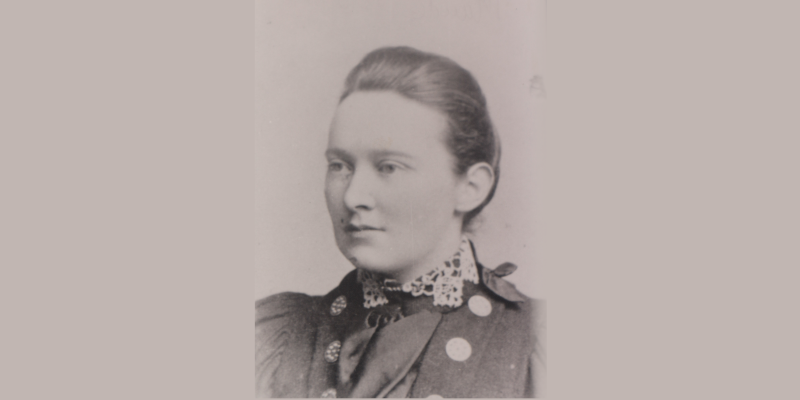Appeal to preserve legacy of Ireland’s pioneer marine biologist on International Day of Women in Science

- Maude Jane Delap (1866-1953) carried out ground-breaking research, despite never attending school unlike her brothers.
- Recognised as the first person in the world to breed jellyfish in captivity, Delap was forced to turn down a prestigious scientific position due to her gender.
- UCC researchers seek to preserve her legacy on International Day of Women and Girls in Science.
Researchers have appealed for help from the public in preserving and promoting the legacy of a pioneering, self-taught marine biologist who is being remembered on Friday, The International Day of Women and Girls in Science.
Maude Jane Delap (1866-1953) is recognised as the first person in the world to breed jellyfish in captivity on Valentia Island in Kerry, and was a respected marine biologist, despite having had no formal education. She was forbidden by her father from accepting a prestigious UK fellowship, which had been offered in recognition of her ground-breaking work.
Although she is remembered locally and her work is renowned among the scientific community, there are gaps in knowledge about how she worked and conducted some of her research.
Jane Sheehan, a Wildlife and Marine Biologist, warns there is an urgent need to catalogue and adequately archive Delap’s notebooks, letters, and other documents.
“Back many years ago, when I first heard of Ireland having its very own pioneering jellyfish researcher, I was completely taken aback; I was born in Kerry and grew up there and yet I had never heard about her. How had I gone all this time without knowing about her? She seemed too monumental for me to have never heard about up until then. I felt compelled to learn more about Maude Delap.
“Her story struck a chord within me. There she was, a woman living remotely on one of the most westerly islands off Ireland, in a place you typically would consider to be cut-off from the world of ground-breaking scientific discoveries. She had no formal education due to her gender. She had no access to the high-tech laboratories or equipment you’d find in a marine biological station at that time. Yet, despite it all, she persevered and continued to carry out the research which she was passionate about. She instantly became an inspiration to me.
“This wild westerly woman was going against all odds and expectations and devoting her life to jellyfish. She was carrying out incredible science in a time where women were dissuaded from doing so. Delap is an inspiration for women in STEM and someone who needs to be celebrated at a wider scale,” she said.
Unlike their brothers, Maude and her sisters were not formally educated. Despite this, she would devote her life to studying and observing her natural environment and the species which inhabited it. Delap’s work included being the first person to correctly observe all of the stages of the complex life cycle of the jellyfish and to create a detailed and visual catalogue of the plankton that inhabits Ireland’s Atlantic.
Her work is still valuable and inspirational to today’s scientists and was so respected by the scientific community at the time that Delap was offered a fellowship by Plymouth Marine Biological Station in 1906; a significant honour. However, her father reportedly forced her to refuse the offer, stating “No daughter of mine will leave home except as a married woman.” Delap stayed on Valentia, un-married, until her death.
She continued to correspond with marine biologists around the world, and provided them with valuable observations, information, and specimens. She also contributed to a number of scientific journals as part of her work. Her letters are rich with colourful observations about life on Valentia at the time; pleas to reimburse local people for reporting their nature finds, and titbits of gossip of the island, including the latest on the Knights of Kerry, a thriving slate quarry, the lifeguard station, and the cable station where the first cable connecting Europe and North America came ashore.
Researchers working on the LIVE project (www.ecomuseumlive.eu), led by Dr Fidelma Butler of University College Cork, want to bring together as much of her work as possible to celebrate her legacy and make it accessible to the public. Llŷn Iveragh Ecomuseums (LIVE) is a collaboration between Welsh and Irish community organisations, academic departments and local governments on the Iveragh Peninsula (south-west Ireland) and Llŷn Peninsula (north-west Wales).
The LIVE project is appealing to anyone who may have stories, images, or memories of Maude Delap to get in touch. Anyone with information can contact the project team on live@ucc.ie and visit the project website at www.ecomuseumlive.eu.
Ms Sheehan is knowledge gatherer with the project and will be giving a webinar on her work on jellyfish and Maude Delap on Friday, February 11at 1pm. Anyone interested in this webinar can sign up on https://www.ecomuseumlive.eu/event-calendar.
